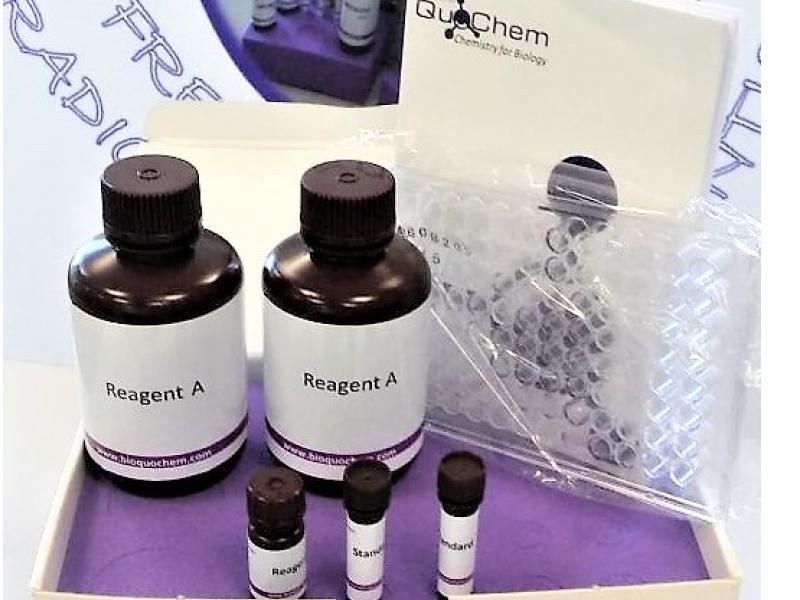New
BCA Protein
Reference : KB03005
BCA Protein Assay Kit
Countries eligible for delivery
Countries eligible for delivery:
France (except Corsica and overseas departments and territories), Belgium, French overseas departments and territories, French Polynesia, Luxembourg, Switzerland, France (Corsica)
The BCA Protein Assay is a detergent compatible formulation based on Bicinchoninic acid (BCA) for the colorimetric detection and quantitation of total protein. The principle of the BCA assay relies on the formation of a Cu2+ protein complex under alkaline conditions, followed by reduction of the Cu2+ to Cu+.
The purple colored reaction product of this assay is formed by the chelation of two molecules of BCA with one cuprous ion. This water-soluble complex displays a strong absorbance at 562 nm.
The BCA protein assay was first described in 1985 to determine protein concentration with the use of bicinchoninic acid (BCA). As in the Lowry assay, the biuret reaction is the first step in the reaction that takes place in the BCA assay. In this reaction, protein reduces Cu2+ to Cu+ in an alkaline environment. After that, BCA reacts with Cu+-ions to form a purple colored complex that has an absorbance at 562 nm.
The absorbance increases linearly with increasing protein concentration over a broad working range3 (20-2000 μg/ μl). Although the method consists of two reactions, it only requires the addition of a single reagent.
After the reduction of the divalent copper ion, Cu+ reacts with BCA. Then, the chelation of two molecules of BCA with one cuprous ion forms the purple colored reaction. The first reaction occurs at lower temperatures and is the result of copper and BCA interaction with aminoacid residues in the protein.
At elevated temperatures, the peptide bond is responsible for color development. Hence performing the assay at 37ºC or 60ºC versus room temperature increases the sensitivity. Additionally, it reduces the variation in the response of the assay, as a function of protein composition. When possible, the assay should be incubated at 60ºC since, after reaction is complete. As a result, the absorbance does not increase appreciably. However, after cooling samples incubated at 37ºC to room temperature, the blank continues to increase in absorbance at ~2.3% every 10 min.
The purple colored reaction product of this assay is formed by the chelation of two molecules of BCA with one cuprous ion. This water-soluble complex displays a strong absorbance at 562 nm.
The BCA protein assay was first described in 1985 to determine protein concentration with the use of bicinchoninic acid (BCA). As in the Lowry assay, the biuret reaction is the first step in the reaction that takes place in the BCA assay. In this reaction, protein reduces Cu2+ to Cu+ in an alkaline environment. After that, BCA reacts with Cu+-ions to form a purple colored complex that has an absorbance at 562 nm.
The absorbance increases linearly with increasing protein concentration over a broad working range3 (20-2000 μg/ μl). Although the method consists of two reactions, it only requires the addition of a single reagent.
After the reduction of the divalent copper ion, Cu+ reacts with BCA. Then, the chelation of two molecules of BCA with one cuprous ion forms the purple colored reaction. The first reaction occurs at lower temperatures and is the result of copper and BCA interaction with aminoacid residues in the protein.
At elevated temperatures, the peptide bond is responsible for color development. Hence performing the assay at 37ºC or 60ºC versus room temperature increases the sensitivity. Additionally, it reduces the variation in the response of the assay, as a function of protein composition. When possible, the assay should be incubated at 60ºC since, after reaction is complete. As a result, the absorbance does not increase appreciably. However, after cooling samples incubated at 37ºC to room temperature, the blank continues to increase in absorbance at ~2.3% every 10 min.
Why using BCA Protein Assay Kit?
BCA protein quantification kit is advantageous as it does not interact with as many contaminants and buffer components as the Folin-Ciocalteu reagent, especially detergents. Components that interfere with the BCA protein quantification kit either lead to the reduction of Cu2+ (as DTT) or are copper chelators (as EGTA). Generally, these are not critical components of buffers and omissible prior to the assay.
The BCA assay has many advantages over other protein determination techniques. That is because there is less susceptibility to detergents, is easy to use and the color complex is stable.
BCA protein quantification kit is advantageous as it does not interact with as many contaminants and buffer components as the Folin-Ciocalteu reagent, especially detergents. Components that interfere with the BCA protein quantification kit either lead to the reduction of Cu2+ (as DTT) or are copper chelators (as EGTA). Generally, these are not critical components of buffers and omissible prior to the assay.
The BCA assay has many advantages over other protein determination techniques. That is because there is less susceptibility to detergents, is easy to use and the color complex is stable.
Biological samples
Notice BCA protein - kit de dosage.pdf
The attached documents are subject to change. To receive the latest updates, please contact us.
Specifications
| Reference | Packaging | |
|---|---|---|
| KB03005-1000 | 1000 tests (96 puits/wells format) | |
| KB03005-200 | 200 tests (96 puits/wells format) |

